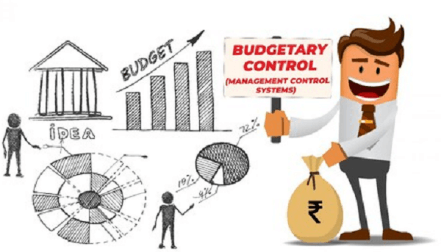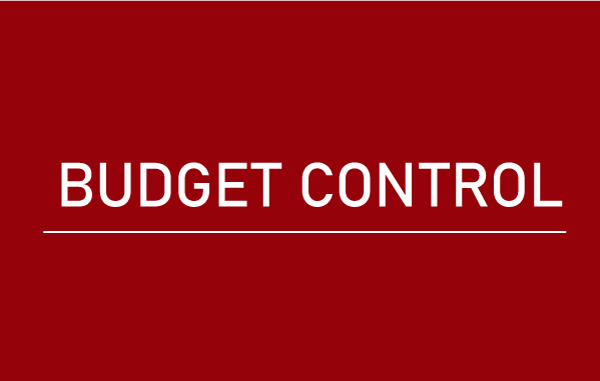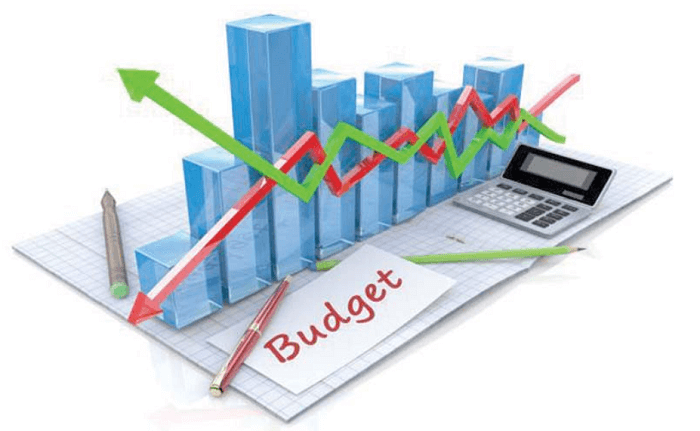Advantages and Disadvantages of Budgetary ControlBudgetary control is crucial since it is an essential component of every business and has much more significance regarding money. The budgetary control process involves creating budgets and using them to track and manage the revenues and expenses of commercial entities. It is one where variances are determined by comparing actual and expected results. Budgetary control is a useful technique that helps management ensure that all operations follow a predetermined plan and set of regulations. It aids in the correct execution of all strategies to timely accomplish the intended goals. Budgetary control outlines the objectives to be met, offers a strategy for achieving them, organizes organizational responsibilities, and routinely assesses performance to identify and correct variances. Reducing resource waste effectively contributes to increasing firm profitability. 
How The Budgetary Control System Works

Advantages of Budgetary Control1. Planning-Oriented The biggest benefit of budgetary control is that it aids in planning because once a company has turned plans from paper to reality, it needs to have a proper budget allocation for the plans to be carried out and for the company to avoid being in a situation where its budget is either less than required or more than necessary. Identifying where differences between the planned and actual budget are greatest also aids in decreasing inefficiencies and waste. 2. Enhanced Coordination Its main goal is to improve coordination between departments or divisions within a company organization. The budget committee establishes the tasks and responsibilities of each department and informs them to perform as necessary. It is the one that governs all diverse organizational functions. Budgetary control offers strategies for accomplishing the organization's specific goals. It entails planning for our activities and imposing spending restrictions on all costs. This brings in the affirmation of all concerned with a united team. 3. Helps Maximize Profit Businesses strive to maximize profits, and budgetary control via cost control aids the corporation in reaching this goal since a lower cost of production translates to a better profit margin for the business. Therefore, in a sense, budgetary control assists the business in reaching the profit maximization goal. Minimizing input costs is one of the major factors in increasing profit margins. Reducing all resource waste seeks to increase the organization's overall efficiency. This procedure keeps an eye on how each division is doing and makes the required actions to boost production. The creation of budgets regulates all outlays and tries to increase profitability. 4. Consciousness By setting goals, the budgetary control method makes all employees aware of their duties. Every employee in the company is clear on their responsibilities so that they may work without interruption. Having a plan helps and motivates members to follow up in achieving common goals. The budgetary control offers a method for evaluating managerial performance by setting goals for various divisions. Actual outcomes are contrasted with the budgeted objectives to identify variances. The upper Management is informed of each department's performance. The implementation of Management by exception is made possible by this approach. 5. Economy There will be systematic planning behind expenditures, and there will be cost savings. The money will be spent in the best possible way. Wastage will be eradicated, and the nation's resources will be used wisely. The industry will eventually reap the advantages of the concern, which will then trickle down to the entire country's economy. 6. Introducing Incentive Programs The implementation of incentive compensation systems is also made possible by the budgetary control system. Implementing such plans will be made possible by comparing planned and actual performance. 7. Corrective Measures When there is a performance difference, the Management can take remedial action. The deviations will be routinely notified so that the appropriate action may be taken as soon as possible. The deviations can be identified only after the financial period without a budgetary control system. Referential materials You are forced to compare actual results to theoretical estimates as part of the budgetary control process, which offers certain benchmarks for success assessment. You are forced to consider the figures and the scenarios they depict when you measure your company's performance and its variance from the budget you set. Additionally, this evaluation procedure gives you feedback on predicting skills, highlighting any inaccuracies or weaknesses. 
Disadvantages of Budgetary Control1. Dissuade Effective People Every employee in the firm is given the goals under the budgetary control system. People frequently have the temptation to focus simply on achieving their goals. Though some productive individuals may surpass the objectives, they will still feel satisfied if the targets are met. Consequently, management initiatives may be constrained by budgets. 2. Depends On Top Management's Support The Senior Management must support the budgetary control system. The Management should be ecstatic about the system's achievement and offer unwavering support. This method will fail if there is ever a lack of support from upper Management. 3. It May be Overly Rigid The largest drawback of financial control is that it may be overly strict, which leaves department heads with little room for maneuver, because of this, for instance, if the firm has allocated $10 k for the marketing department, but the department needs $20k due to fierce competition, it will not be able to perform marketing effectively due to budget control, which will result in a loss for the company. 4. Budget Revision Is Necessary Budgets are created with the presumption that particular circumstances will hold. Assumed circumstances might not materialize due to future uncertainty, prompting a change of budgetary goals. Budgets will lose value if goals are often revised, and modifications also incur significant costs. 5. Coordinating Issue The cooperation between many departments is essential for the achievement of financial control. One department's performance impacts results from other departments. The coordination issue must be solved, and a budgetary officer is required. Not every organization can afford to hire a budgetary officer. Poor performance is the outcome of ineffective departmental cooperation. 6. Not Effective in Creating Business Budgetary control demands a significant investment of time, money, and effort on the organization's side. Unlike other business activities that help to increase sales, budgetary control solely serves as a management tool. Therefore, to put it simply, budgetary Management merely aids in controlling spending; it plays no part in generating money. As seen from those mentioned above, budgetary control has both advantages and downsides. For this reason, any organization considering adopting should consider the factors above before making a decision. 7. Future Uncertainty For the upcoming period, budgets are created. The forecasts may not always come true, despite the best efforts to anticipate the future. The future is never guaranteed, and the scenario that is anticipated to exist in the future may alter. The change in future situations disrupts the budgets that must be constructed based on specific assumptions. The unknowns of the future decrease the usefulness of a budgetary management system. |
 For Videos Join Our Youtube Channel: Join Now
For Videos Join Our Youtube Channel: Join Now
Feedback
- Send your Feedback to [email protected]
Help Others, Please Share










